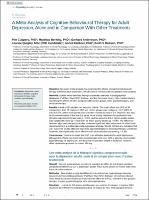Please use this identifier to cite or link to this item:
https://hdl.handle.net/20.500.12202/9664| Title: | A meta-analysis of cognitive-behavioural therapy for adult depression, alone and in comparison with other treatments |
| Authors: | Cuijpers, Pim Berking, Matthias Andersson, Gerhard. De Quigley, Leanne Kleiboer, Annet Dobson, Keith S. 0000-0002-3676-4083 |
| Keywords: | cognitive behavioral therapy (CBT) adult depression pharmacotherapy effective treatment |
| Issue Date: | Jul-2013 |
| Publisher: | Canada : Canadian Psychiatric Assn |
| Citation: | Cuijpers, P., Berking, M., Andersson, G., Quigley, L., Kleiboer, A., & Dobson, K. S. (2013). A meta-analysis of cognitive-behavioural therapy for adult depression, alone and in comparison with other treatments. The Canadian Journal of Psychiatry / La Revue Canadienne de Psychiatrie, 58(7), 376–385. |
| Series/Report no.: | The Canadian Journal of Psychiatry / La Revue canadienne de psychiatrie;58(7) |
| Abstract: | Objective: No recent meta-analysis has examined the effects of cognitive-behavioural therapy (CBT) for adult depression. We decided to conduct such an updated meta-analysis. Methods: Studies were identified through systematic searches in bibliographical databases (PubMed, PsycINFO, Embase, and the Cochrane library). We included studies examining the effects of CBT, compared with control groups, other psychotherapies, and pharmacotherapy. Results: A total of 115 studies met inclusion criteria. The mean effect size (ES) of 94 comparisons from 75 studies of CBT and control groups was Hedges g = 0.71 (95% CI 0.62 to 0.79), which corresponds with a number needed to treat of 2.6 However, this may be an overestimation of the true ES as we found strong indications for publication bias (ES after adjustment for bias was g = 0.53), and because the ES of higher-quality studies was significantly lower (g = 0.53) than for lower-quality studies (g = 0.90). The difference between high- and low-quality studies remained significant after adjustment for other study characteristics in a multivariate meta-regression analysis. We did not find any indication that CBT was more or less effective than other psychotherapies or pharmacotherapy Combined treatment was significantly more effective than pharmacotherapy alone (g = 0.49). Conclusions: There is no doubt that CBT is an effective treatment for adult depression, although the effects may have been overestimated until now. CBT is also the most studied psychotherapy for depression, and thus has the greatest weight of evidence However, other treatments approach its overall efficacy. (PsycINFO Database Record (c) 2016 APA, all rights reserved) |
| Description: | Scholarly article / Open access |
| URI: | https://journals.sagepub.com/doi/10.1177/070674371305800702 https://hdl.handle.net/20.500.12202/9664 |
| ISSN: | 0706-7437 (Print) 1497-0015 (Electronic) |
| Appears in Collections: | Ferkauf Graduate School of Psychology: Faculty Publications |
Files in This Item:
| File | Description | Size | Format | |
|---|---|---|---|---|
| quigley cuijpers-et-al-2013-a-meta-analysis.pdf | 747.71 kB | Adobe PDF |  View/Open |
This item is licensed under a Creative Commons License

